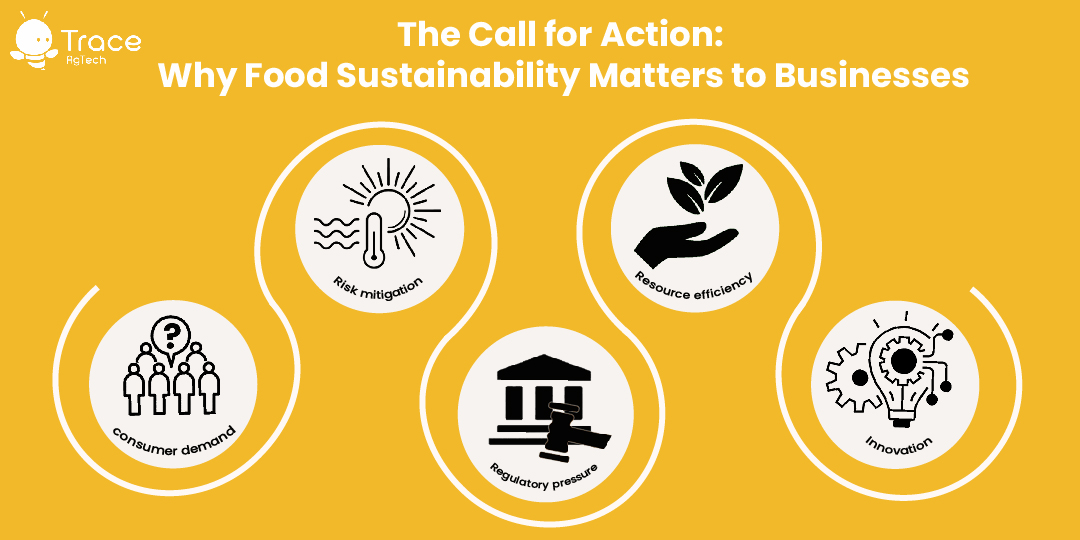Food Sustainability: A Crucial Imperative from Business Perspective
Food Sustainability: A Crucial Imperative from a Business Perspective
In recent years, the topic of food sustainability has gained significant traction, transcending from an environmental concern to a pressing business imperative. The food industry, a cornerstone of global economies, has a pivotal role to play in fostering sustainable practices to ensure a healthier planet and prosperous future for all. This blog delves into the importance of food sustainability from a business perspective, exploring the challenges, benefits, and strategies that companies can adopt to drive positive change.
The Call for Action: Why Food Sustainability Matters to Businesses
Food sustainability refers to the responsible production, distribution, and consumption of food while considering the environmental, social, and economic impacts. From a business perspective, embracing food sustainability is not just a moral obligation but a smart strategy. Several compelling reasons highlight why businesses must prioritize sustainability in their food-related operations:
- Consumer Demand: Modern consumers are increasingly conscious of the environmental and social implications of their choices. Sustainable practices resonate with conscious consumers, leading to increased brand loyalty and market share for businesses that align with their values.
- Risk Mitigation: Climate change, resource scarcity, and social inequalities pose substantial risks to supply chains. Companies that integrate sustainability measures are better equipped to withstand shocks and disruptions, ensuring business continuity.
- Regulatory Pressures: Governments worldwide are enacting stricter regulations on food production and waste management. Businesses that proactively comply with these regulations avoid penalties and operational disruptions.
- Resource Efficiency: Adopting sustainable practices leads to optimized resource use, reduced waste, and lowered operational costs. Efficient processes contribute to better profitability in the long run.
- Innovation Opportunities: Embracing sustainability often drives innovation. Companies that invest in research and development of eco-friendly technologies and practices gain a competitive edge and can tap into emerging markets.

Challenges on the Path to Sustainability
While the benefits are clear, businesses encounter several challenges when transitioning to more sustainable food practices:
- Complex Supply Chains: Food supply chains are intricate, involving various stakeholders. Ensuring sustainability across these chains requires collaboration, transparency, and standardization.
- Cost Considerations: Initial investments in sustainable practices might appear high. However, the long-term benefits often outweigh the upfront costs. Businesses need to shift their perspective from short-term expenses to long-term gains.
- Consumer Education: Communicating the value of sustainable practices to consumers can be challenging. Businesses must educate their customers about the importance of sustainability, influencing their purchasing decisions.
- Resistance to Change: Embracing sustainability often necessitates changes in established processes. Employees and stakeholders might resist these changes, requiring effective change management strategies.
Benefits Beyond the Bottom Line
The journey towards food sustainability brings forth a range of advantages that extend beyond financial gains:
- Enhanced Brand Reputation: Businesses known for their commitment to sustainability gain a positive reputation, attracting environmentally-conscious consumers and investors.
- Long-Term Resilience: Sustainable practices build resilience against supply chain disruptions caused by climate events, pandemics, and other unforeseen circumstances.
- Access to New Markets: Many consumers seek out eco-friendly and ethically-produced goods. By aligning with sustainability trends, businesses can tap into new, growing markets.
- Attracting and Retaining Talent: Employees are increasingly drawn to companies that demonstrate social responsibility. A sustainability-oriented business can attract top-tier talent and reduce turnover rates.
Strategies for Integrating Food Sustainability
Embracing food sustainability requires a holistic approach that spans the entire business ecosystem:
- Supply Chain Optimization: Collaborate with suppliers to ensure sustainable sourcing practices, reduce waste, and improve transparency.
- Reducing Food Waste: Implement measures to minimize food waste throughout the production and distribution process. Donating surplus food to local communities can also have a positive impact.
- Innovative Packaging: Invest in eco-friendly packaging solutions to reduce plastic waste and minimize the environmental footprint of products.
- Energy Efficiency: Transition to renewable energy sources to power operations, reducing greenhouse gas emissions and energy costs.
- Consumer Education: Communicate the importance of sustainability to consumers through marketing campaigns and transparent labeling.
- Collaborative Initiatives: Join industry-wide initiatives and partnerships that promote sustainable practices. Collaboration accelerates change and fosters collective impact.
In Conclusion
Food sustainability is no longer just an ethical concern; it’s a business imperative. By integrating sustainable practices, companies can not only drive positive environmental and social impacts but also position themselves for long-term success. The food industry’s transformation towards sustainability is a journey of challenges and opportunities, and the companies that proactively embrace this journey will lead the way to a more prosperous and sustainable future for all.


Any comments?